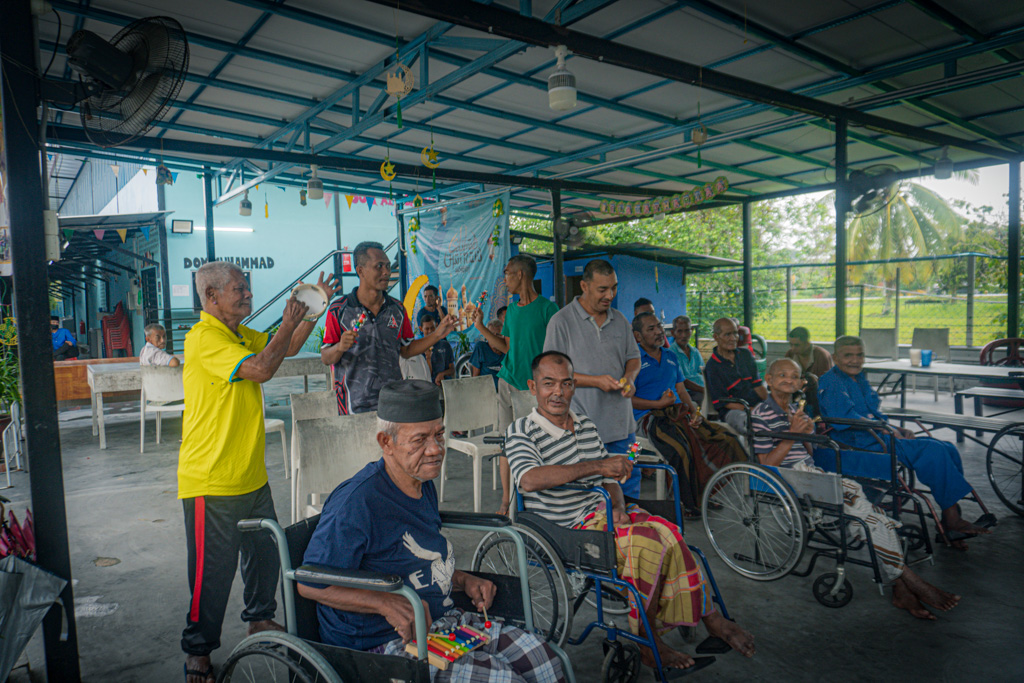
In a heartwarming collaboration, five final year iCEPS e-PJJ Occupational Therapy students from the Faculty of Health Sciences at UiTM Puncak Alam joined hands with the residents of the Pusat Jagaan Warga Emas Nur Ehsan Tangkak, Johor on 10th of May 2024.
Pusat Jagaan Warga Emas Nur Ehsan Tangkak, managed by the Department of Social Welfare under the Ministry of Women, Family, and Community Development, is one of three similar centres established across Malaysia. With a capacity to accommodate 50 individuals, including 21 senior citizens and 29 non-elderly residents, it serves as a residential care centre providing protection, supervision, rehabilitation, and training as per Section 2 of Act 506.
The collaborative project aimed to address several key areas of concern among the residents. Firstly, sarcopenia and frailty were identified as significant issues among the elderly population. Through assessments utilizing SARC-F criteria, all 21 senior citizens were found to exhibit signs of frailty, emphasizing the importance of interventions to improve physical performance and functioning. Secondly, the Elderly Cognitive Assessment Questionnaire (ECAQ) highlighted a high risk of dementia among six residents. The concept of cognitive frailty (CF) was noted, underscoring the need for strategies to promote healthy aging of cognitive skills. Thirdly, the Katz Index of Independence in Activities of Daily Living revealed varying levels of independence among residents, with some requiring assistance, particularly those with mobility issues. Similarly, the Lawton Instrumental Activities of Daily Living highlighted a decline in performing certain tasks independently. Finally, lack of leisure activities due to manpower constraints was identified as a significant issue. Leisure engagement was recognized as vital for promoting physical and mental well-being among the elderly.
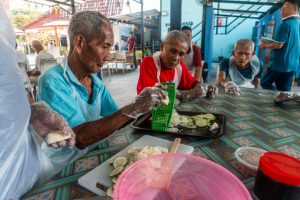
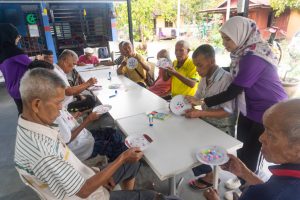
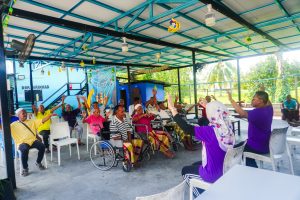
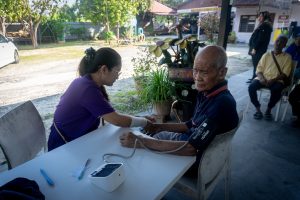
Physical activity plays a crucial role in preventing the risk of non-communicable diseases, as highlighted by a growing body of research. Engaging in regular physical activity lowers the risk of developing chronic illnesses such as osteoporosis, type 2 diabetes mellitus, hypertension, cardiovascular disease, stroke, and cognitive decline. Moreover, physical activity has been shown to manage illnesses like dementia, depression, anxiety disorders, stroke, back pain, and constipation. Cognitive training is another essential aspect of promoting well-being among the elderly. Cognitive aging is a common concern, but cognitive training interventions can help mitigate cognitive decline and emotional problems associated with aging. These interventions aim to improve cognitive functioning through standardized tasks targeting memory, attention, problem-solving, reasoning, and processing speed. Creative activities, such as arts-based interventions, have shown promise in enhancing cognitive capacities and emotional well-being among older adults with cognitive impairments.
Domestic activities, such as cooking, also contribute significantly to improving the quality of life for elderly individuals. Cooking activities not only boost confidence and self-esteem but also provide a social outlet for seniors to bond with others over shared recipes and culinary experiences. Engaging in cooking activities stimulates cognitive function and offers a sense of accomplishment and enjoyment, promoting independence, creativity, and overall well-being. Recreational therapy, particularly music-based intervention, is a valuable addition to occupational therapy interventions. Music has been shown to have significant effects on emotional well-being and quality of life. Music therapy interventions, including activities such as playing musical instruments, creating music, or listening to carefully selected pieces, have been found to decrease depressive symptoms and anxiety. Moreover, music therapy offers a unique pathway for addressing behavioural and psychological symptoms of dementia, contributing to overall mental health improvement.
In summary, the collaborative efforts between iCEPS ePJJ Occupational Therapy students and Pusat Jagaan Warga Emas Nur Ehsan Tangkak represent a significant step towards addressing the multifaceted needs of the elderly residents. By focusing on physical, cognitive, functional, and leisure aspects, the project aims to enhance the quality of life and promote healthy aging within the care centre. Such initiatives underscore the importance of community engagement and interdisciplinary collaboration in providing holistic care for vulnerable populations.
This endeavour not only benefits the residents but also provides valuable experiential learning opportunities for the participating students, fostering empathy, compassion, and a deeper understanding of geriatric care. As the project continues to unfold, it is hoped that it will serve as a model for similar initiatives nationwide, ultimately contributing to the well-being of elderly individuals across Malaysia.
